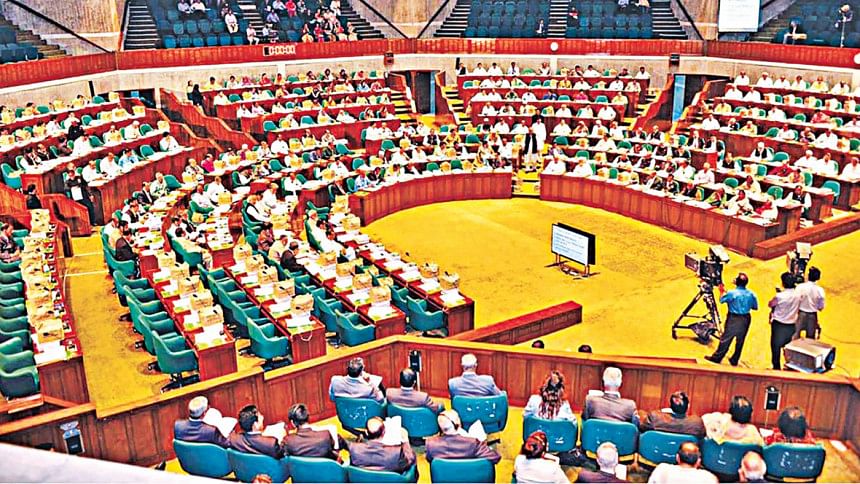Looking back at the laws enacted in 2020

Women and Children Repression Prevention (Amendment) Act, 2020
Amidst pressing demands of protests across the country for rape law reforms, the Women and Children Repression Prevention (Amendment) Ordinance 2020 was passed and later enacted by the Parliament as the Women and Children Repression Prevention (Amendment) Act 2020. The Amendment most notably introduces death penalty as a punishment for rape. The Amendment also amends the provision relating to medical tests and widens the law to include medical test of both the victim and the accused. Furthermore, it introduces a provision for mandatory DNA test of the accused irrespective of their consent. The amendments have received mixed reaction as many rights organisations raised concerns regarding the effectiveness of death sentence as a deterrent of rape and the shortcomings in using DNA evidence in rape trials.
Use of Information Technology by Court Act, 2020
Following the closure of the Supreme Court from 24 March, several developments took place which allowed the court to hear cases virtually and entertain cases that are 'urgent'. With a view to regulating the functions of the virtual courts, the Use of Information Technology by Court Ordinance, 2020 was passed which was later replaced by the Use of Information Technology Act, 2020. The Act defines 'virtual presence' as the presence through audio-video or other digital means, in the proceedings of the court. As per the law, the courts may conduct trial, inquiry, hear appeals, take evidence, hear arguments and pass orders and judgments virtually. Apart from the procedures therein mentioned, the existing procedural laws shall be applicable. The Act has been seen as a necessary step in ensuring that the rights of the people to access justice are not obstructed during the pandemic; however, in the absence of prior experience in digital platforms, the adaptation has been a challenge.
Companies (Amendment) Act, 2020; Companies (Second Amendment) Act, 2020
The Companies Act 1994 was amended twice – once in February and again in November. The first amendment removed the requirement of use of the company's seal in documentation with a view to easing the procedure of transactions. The second amendment introduced the concept of One Person Company (OPC) with a view to extending the advantages of incorporation to sole proprietorships. The amendment allows natural persons to form an OPC and states that the minimum paid-up capital for OPCs is BDT 50 Lakh and the maximum paid-up capital shall be BDT 10 crore. The Act also states that one natural person may only form one OPC and must nominate a person to whom the share shall pass upon the death or incapacity of the shareholder. Although a significant step in providing recognition to sole proprietorships, the amount of the minimum paid-up capital has been criticised as being too high, thus being disadvantageous to small businesses.
Air Transport (Montreal Convention) Act, 2020
The Act has been enacted in order to incorporate the provisions of Unification of Certain Rules Relating to International Carriage by Air signed in Montreal on 28 May, 1999 (Montreal Convention) into the domestic legal framework. The Act applies to passengers, baggage and cargo carried by air transports. Under this new law, the passengers shall be entitled to compensation from the airlines in case of death or injury and for damage to their baggage, the amount of which is to be calculated as per the Special Drawing Rights (SDR) provisions in line with the Montreal Convention. In case of death of passengers, their successors may apply for compensation and such compensation shall be divided proportionately if there is more than one successor.
Marine Fisheries Act, 2020
The Act replaces the previously applicable Marine Fisheries Ordinance, 1983. Under the Act, the Government is empowered to declare, in line with international standards, any sea area as areas where fishing is allowed and also to declare, with a view to protecting the fisheries, restrictions on fishing for any particular species. The government is also empowered to pass necessary directions and orders in order to prevent illegal, unreported and unregulated fishing. The Director General of Fisheries may, under this Act, take necessary actions including monitoring, controlling and surveillance, and determine the allowable catch with regard to any species in order to ensure maximum sustainable yield. Licenses issued under the Act shall specify the areas in which fishing is allowed, the species of fish that may be caught and the machineries that may be used for fishing. The government may also declare specific areas as 'mariculture areas' for the expansion of Blue Economy.
The writer works for Law Desk, The Daily Star.

 For all latest news, follow The Daily Star's Google News channel.
For all latest news, follow The Daily Star's Google News channel. 



Comments